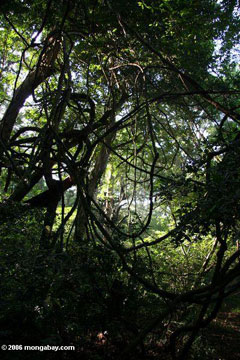Bali delegates agree to support forests-for-climate (REDD) plan
mongabay.com
December 16, 2007
Delegates meeting at the U.N. climate conference in Bali agreed to include forest conservation in future discussions on a new global warming treaty, reports the Associated Press. The move could lead to the transfer of billions of dollars — in the form of carbon credits — from industrialized countries to tropical nations for the purpose of slowing greenhouse gas emissions by reducing deforestation rates. Deforestation presently accounts for roughly 20 percent of anthropogenic emissions worldwide.
While controversial, the program, known as Reducing Emissions From Deforestation and Degradation (REDD), has been widely seen by scientists and environmentalists as a way to address environmental degradation by assigning value to intact ecosystems like rainforests and peat swamps.
"[REDD has] the potential to shift the balance of underlying economic market forces that currently favor deforestation, by raising billions of dollars for the ecosystem services provided by rainforest regions," wrote a team of scientists in a paper published in Science last month.

Rainforest in Uganda.
Researchers, together with the UK government's 2005 Stern Review, say that forest protection could be one of the most cost-effective ways to address climate change.
"Conserving tropical forests could ultimately be one of the cheapest ways we have available to slow global warming," said Dr. William Laurance, a biologist with the Smithsonian Tropical Research Institute who has co-authored several papers on REDD. "The costs of forest conservation are modest and deforestation is a massive source of emissions, so slowing deforestation is like plucking the low-hanging fruit — there’s a lot of benefit for not a lot of cost. And of course we're not just storing carbon; we're also saving the world’s most biologically important real estate, providing a place for local and indigenous peoples, and helping to stabilize delicate soils and reduce catastrophic flooding."
Delegates at Bali apparently agreed, recommending that efforts to reduce emissions from deforestation and forest degradation should be "strengthened and supported" but stopping short of calling for anything other than voluntary action on REDD.
REDD still faces many challenges, especially in implementation. Issues range from "permanence" (whether a county can ensure that forest carbon savings are permanent) to "leakage" (what happens when carbon conservation in one area drives deforestation in another?) to baseline data establishment (how does one measure historic deforestation to establish a baseline for calculating reduction?). Further questions over land rights (will REDD trigger a land rush by industrial agriculture giants and forestry firms?) as well as how local communities will benefit (the cost of registering and establishing a REDD project may top $50,000, a nearly insurmountable sum for communities and small-scale forest holders in some of the world's poorest countries) are also valid. There is also ongoing squabbling between a coalition of forest nations and Brazil, which sees REDD as an attempt to limit its economic development of the Amazon rainforest. Some forest-rich countries that have low deforestation rates have expressed concern they will be left out of the process since their forests are not under immediate threat.
Despite these concerns, it appears likely the REDD initiatives will move forward. Last week nine industrialized governments announced plans to put US$165 million (€114 million) toward the World Bank's newly created Forest Carbon Partnership Facility, a scheme that will offer tropical countries carbon offset credits to preserve forests. The U.S. did not pledge any funds but some 30 tropical countries in Africa, Latin America and the Asia-Pacific stood to benefit from what the World Bank called "the first financial mechanism to pay countries for saving their tropical forests." In the spirit of the progress on REDD, Governors from the Brazilian state of Amazonas and the Indonesian provinces of Aceh, Papua and West Papua agreed to a moratorium on logging until the carbon values of their forest lands is assessed.
Read more... Sphere: Related Content









No comments:
Post a Comment